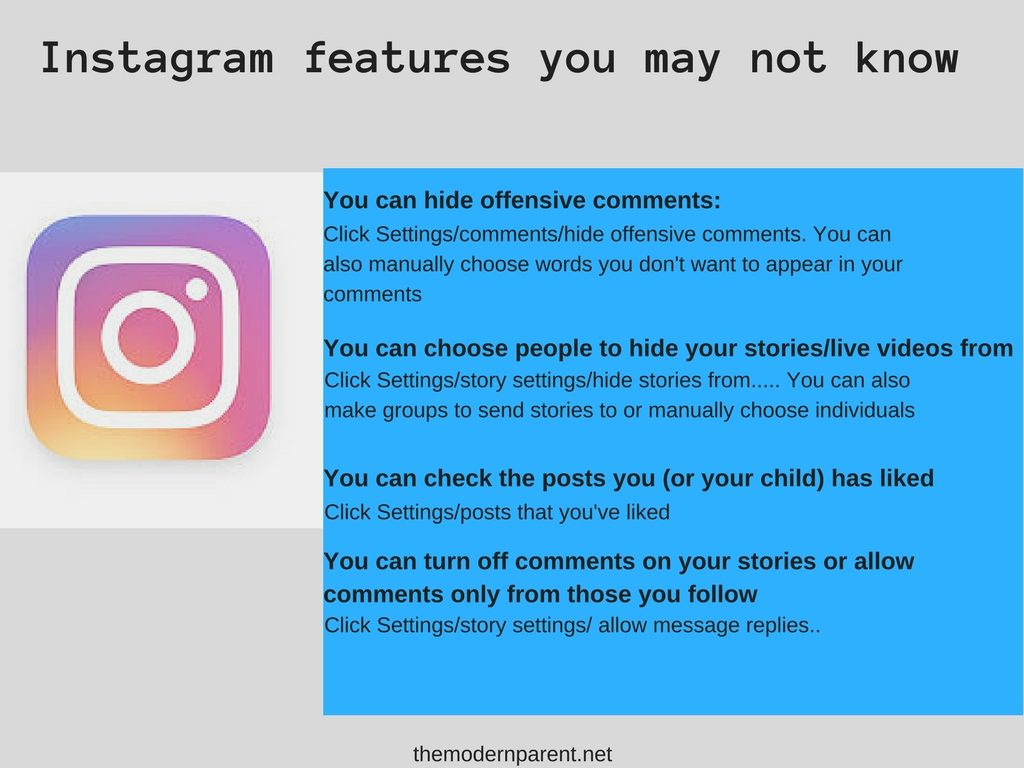When should I let my child have Instagram? One of the many questions I get asked as it seems to be the social network most young people look to as their first foray into the world of social networking. In saying that, if they are playing on the likes of Musical.ly then this too is a social networking site so they may already be well and truly amongst it all. It is important to bear in mind that any app they play on that has the ability to follow people, find friends or followers, share content, comment or like content, is essentially a social networking app.
Parents are often worried when they read click bait headlines such as ‘Instagram is the most dangerous app in the world’, ‘you are a bad parent if your kids is allowed Instagram’ etc and look to ban certain apps whilst unaware of the other apps their kids may take up in light of the ban (or download anyway behind your back).
For the record there are many ways you can get in to trouble on Instagram. But also on Snapchat, Skype, Faceboook, Whatsapp, iMessage, Youtube, crossing the road, riding a bike, playing sport….
Because yes there are dangers everywhere in life. We cannot exclude our children from everything that could possibly hurt them in the hope they stay safe. What we want to do, is to give them the skills to be safe wherever they find themselves. And not only stay safe. But have a good, positive experience.
Because in general it is fair to say it is not the technology that hurts our kids but the behaviours around the use of the technology.
And whilst you won’t keep up with every app your kid hangs out on, the more you learn about them, the better the conversations you can have with them about the types of behaviours that will and won’t get them in to trouble. Because it is also fair to say, that whilst many young people are hanging out on social networks, they are essentially hanging out in playgrounds that are vastly different to the ones we grew up in, and not ones that were created with young people in mind
When it comes to letting kids on Instagram, many will take the view that 13 is a good age as it is the recommended age by Instagram (this is to ensure they comply with US laws of not collecting email addresses of people under 13). But age alone does not imply one is ready to hang out in the often very adult worlds of social networks. It is also true and one would be naïve to pretend otherwise, that many, many users are well under the age of 13. One would hope that the parents have a strong understanding of what their children may face, who they may interact with and how the networks function and what they are capable of if this is the case. In essence if your child is on these apps at a young age you should be paying close attention. And lots of young people are doing a great job of using apps such as Instagram and are not finding themselves in any danger, making good decisions and enjoying the time they spend connecting with others.
These apps are changing all the time and making updates to the way they are being used. So lets look at some of the things parents should know about Instagram in order to make the best decisions for their families, and even more importantly, to have the best conversations with their kids around how they use these apps.
Some facts about Instagram
• It is a photo, video sharing app whereby your photos and videos are uploaded to your feed to be seen by all your followers who can like or comment on your photo/video.
• Followers must be accepted by the user and can be blocked at anytime
• Live video streaming is also available.
• Instagram stories are another feature whereby photos or short videos are added to your 24 hour story reel that stays live for the day, thus giving your followers a less curated, more natural/spontaneous look at your day.
• You can manually choose which followers to see your story to ensure only they have access. You can also create different ‘groups’ and you can choose people to hide your stories from (Settings, story settings, hide stories from…) So mum and dad just because you are following them doesn’t mean they are letting you see everything they post.
• You can allow messages from your stories or just the people you follow or turn off story messages altogether (settings/story settings/allow message replies…).
• You can delete, report or turn off comments altogether.
• Now you can turn on ‘hide offensive comments’ or manually filter out certain words you don’t want to appear in your comments. (this is the latest initiative by Instagram to help make it a safer place to interact and ‘foster kinder and more inclusive communities’) see image below
• You can check the posts your child has liked by going to settings/posts that you’ve liked.
• Instagram have recently committed to a new filtering system to block out certain offensive material. That being said you can still find porn, violence, drugs and a whole lot of other stuff you don’t want your kids to see and they can also be asked to send nudes.
• Hashtags are used to search content related to any subject or theme.
• Many young people have a second Instagram account (a FINSTA) where the content may be slightly different to the one mum and dad are following. Not necessarily ‘bad’ content, just stuff they don’t need parents to be seeing all the time. (Imagine your parents hanging out in your room when you were young and had a sleepover. They may not have been ‘bad’ conversations you were having, just not ones mum needed to be involved in. Being ok with this obviously depends on age and maturity and you certainly don’t want your young child starting out on Instagram to have more than one account as this is the time you are helping them learn the behaviours.
• Location services are available to see where the user was when they posted a photo. This can be turned off under location settings

The Psychology of Instagram
- Some people could use Instagram and care less about the number of likes they get on a photo or video
- Some people will take down a photo if it doesn’t get the desired amount of likes in the desired amount of time, thus rendering it a failure and not worthy of staying up on their feed
- Some view the likes and comments on their photos/videos as social currency, basing their popularity on the affirmations from their followers, some of whom they know and many of those they don’t know
- Hashtags like TBH (to be honest) can be a a way to spill your emotions, be straight up with someone or be downright nasty as can those that ask each other to give them a ‘rating’ from 1 to 10.
- For those who follow ‘social influences’ and big name ‘Instagrammers’, it is important to recognise that many admit to taking on average 70 photos to get the perfect photo that they deem fit for their feed.
- Young people often use the profile/bio section of Instagram to highlight their inner circle of friends or latest love. So it’s a bit of a buzz to find yourself in someones bio and a status symbol of your relationship. Unless of course you have a fight or break up and you find yourself dethroned.
- A young persons Instagram feed can come to represent how they want the word to view them. Sometimes this is a positive reflection of who they are, sometimes it is not.
- Like all social networking sites its good to know when to pull out of an argument or conversation that is futile, becoming threatening or abusive. Many people inhabit these places who come with vastly different agendas, backgrounds, values and beliefs and one needs to know when not to engage.
- Instagram can be a way for young people to seek out their passions, share their love of something and be inspired by others. There are some amazing artwork and designs found on Instagram for example, and its not all selfies (not that there is anything wrong with the odd selfie, as long as you are not killing yourself to get it perfect and relying on the likes and comments to fuel your self esteem).
- Those that have the best time using Instagram are well aware of the curated nature of peoples feeds and the highlights reel that we often only see. Those that can see it for what it is, enjoy the banter, the pictures and even the inspiration from others, usually find themselves able to walk away, safety and self esteem in tact.
Like all things, education and open honest conversations about the possible dangers but also about the benefits can help ensure young people have a positive experience on all apps including Instagram. Many kids are enjoying the connections they have with their friends, they enjoy being creative with photos and sharing their achievements and these are the things we also need to be focusing on. Kids will find a way around this stuff sooner or later, so its best you arm yourselves and them, with the skills and understanding to ensure they have the thinking and behaviours to make the best decisions every time they go online.

